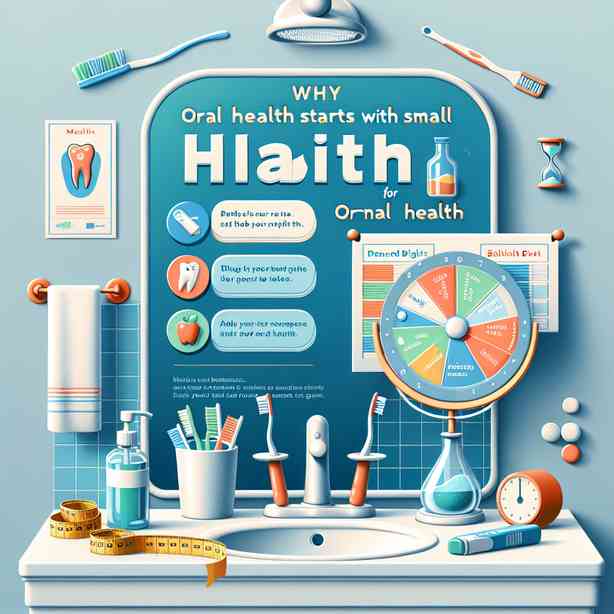
Oral health is an essential component of overall well-being, yet it is often overlooked in our daily routines. The journey to excellent oral health begins with small, intentional habits that, when practiced consistently, can lead to significant improvements. Understanding the connection between our daily behaviors and oral wellness can empower us to take charge of our dental health in a meaningful way.
One of the most important habits for maintaining oral health is regular brushing. The American Dental Association recommends brushing twice a day for at least two minutes each time. This simple yet effective habit prevents the buildup of plaque, a sticky film of bacteria that can lead to cavities and gum disease. While many may think they brush long enough, timers or electric toothbrushes can help ensure that individuals are reaching the recommended duration. Using fluoride toothpaste also enhances this practice, as fluoride strengthens the enamel and makes it more resistant to decay.
In addition to brushing, flossing plays a crucial role in oral hygiene. Many people neglect this step, thinking that brushing alone is sufficient. However, toothbrush bristles cannot reach the tight spaces between teeth where food particles and plaque can accumulate. Flossing daily removes debris and plaque buildup, significantly lowering the risk of developing cavities and gum disease. It may seem tedious at first, but incorporating flossing into your daily routine can become as automatic as brushing, especially with the wide variety of flossing products available, including traditional dental floss, floss picks, and water flossers.
Another fundamental habit is mouth rinsing. Incorporating an antibacterial mouthwash can further aid in reducing plaque and preventing gum disease. Mouthwashes that contain antiseptics can help kill bacteria that brushing and flossing might miss. Additionally, some mouth rinses are formulated to combat bad breath, providing a fresh feeling throughout the day. However, it’s essential to choose an alcohol-free mouthwash, as alcohol can cause dryness in the mouth, leading to potential issues like bad breath and cavities over time.
Diet also plays a critical role in maintaining oral health, and small changes in your eating habits can yield significant benefits. Consuming a balanced diet rich in vitamins and minerals strengthens teeth and gums. Foods high in calcium, such as dairy products, leafy greens, and fortified plant-based milks, are vital for maintaining strong enamel. Similarly, crunchy fruits and vegetables like apples and carrots can help cleanse teeth while providing essential nutrients. Reducing sugar intake, particularly from sugary beverages and snacks, is equally important, as sugar feeds bacteria in the mouth that contribute to tooth decay. Instead, consider snacks that are lower in sugar or even sugar-free options.
Regular dental check-ups cannot be overlooked when discussing oral health habits. Routine visits to the dentist allow for professional cleanings that remove tartar buildup and help identify potential problems early on. The American Dental Association recommends visiting the dentist at least once every six months, but those with specific dental concerns may require more frequent visits. These appointments not only keep your smile looking its best but also provide an opportunity for education on proper dental care practices tailored to your individual needs.
Moreover, developing a habit of self-examination can be beneficial in identifying any potential dental issues early. Regularly inspecting one’s own mouth for abnormalities, such as unusual lumps, swelling, or changes in the color of gums, can alert individuals to potential problems that may require professional attention. If anything seems off, it’s crucial to consult a dentist promptly.
For those who wear braces or other dental appliances, maintaining oral hygiene becomes even more critical. These devices can trap food and plaque, making regular cleaning indispensable. Special cleaning tools designed for braces can aid in thoroughly cleaning around brackets and wires, preventing decay. Additionally, individuals with dental appliances should consider softer, gentler toothbrushes to avoid damaging the orthodontic equipment while ensuring cleanliness.
It’s important to be aware of the effects of certain habits, such as smoking, on oral health. Tobacco products, including cigarettes and chewing tobacco, significantly increase the risk of gum disease, tooth decay, and oral cancer. Quitting smoking or using tobacco products can lead to improved gum health and a decrease in the risks associated with various oral diseases. If you or someone you know is struggling to quit, seeking support from a healthcare professional or support group could be a valuable step towards better oral health.
Staying hydrated is another often underestimated habit that contributes significantly to oral health. Saliva plays an essential role in washing away food particles and neutralizing acids produced by bacteria in the mouth. Drinking plenty of water not only maintains hydration but also stimulates saliva production. It is advisable to drink water throughout the day, especially after meals, to help cleanse the mouth and keep the oral cavity healthy.
Finally, establishing a routine that incorporates all these habits can make a remarkable difference in your oral health. Creating a morning and evening routine that includes brushing, flossing, rinsing, and monitoring dietary habits can lead to consistency. Setting reminders or using apps dedicated to dental care can help reinforce these habits, making them a natural part of daily life.
In conclusion, oral health starts with small habits that, when practiced diligently, can lead to a lifetime of healthy smiles. By prioritizing oral hygiene through regular brushing, flossing, rinsing, and making mindful dietary choices, individuals can take significant steps toward ensuring their dental well-being. Regular visits to the dentist, self-examinations, awareness of habits that may harm oral health, and staying hydrated further enhance these efforts. Remember that small, consistent actions yield significant results over time. Investing in these habits today not only improves your oral health but also enhances your overall quality of life, leaving you with a brighter, healthier smile for years to come.


